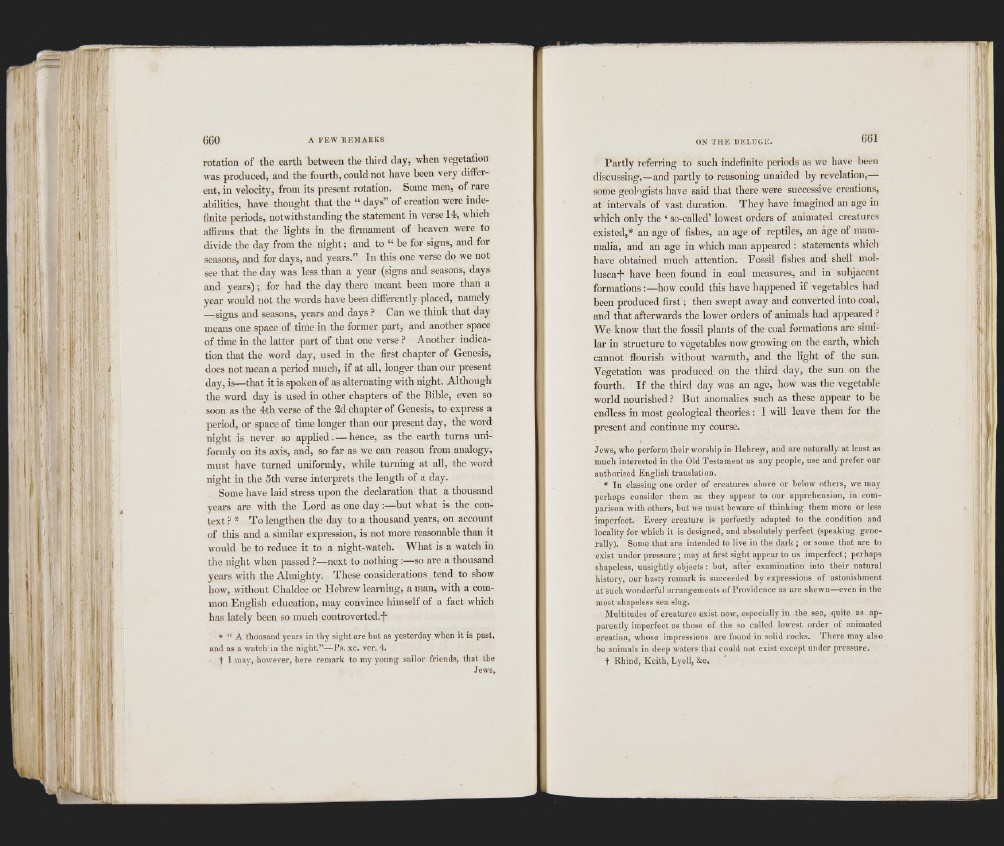
i i i ) 7 ri
li î 7 I
it ! K
S ,, '
! ,,
I t lYJ 1' '!( I
rotation of the eai'th between the third day, when vegetation
was produced, and the fourth, could not have heen very different,
in velocity, from its present rotation. Some men, of rare
abilities, have thought that the “ days” of creation were indefinite
periods, notwithstanding the statement in verse 14, which
affirms that the lights in the firmament of heaven were to
divide the day from the night; and to “ be for signs, and for
seasons, and for days, and years.” In this one verse do we not
see that the day was less than a year (signs and seasons, days
and yeai-s); for had the day there meant been more than a
year would not the words have been differently placed, namely
—signs and seasons, years and days ? Can we think that day
means one space of time in the former part, and another space
of time in the latter part of that one verse ? Another indication
that the word day, used in the first chapter of Genesis,
does not mean a period much, if at all, longer than our present
day, is—that it is spoken of as alternating with night. Although
the word day is used in other chapters of the Bible, even so
soon as the 4th verse of the 2d chapter of Genesis, to express a
period, or space of time longer than our present day, the word
night is never so applied.— hence, as the earth turns uniformly
on its axis, and, so far as we can reason from analogy,
must have turned uniformly, while turning at all, the word
night in the 5th verse interprets the length of a day.
Some have laid stress upon the declaration that a thousand
years are with the Lord as one d ay :—but what is the context
? * To lengthen the day to a thousand years, on account
of this and a similar expression, is not more reasonable than it
would he to reduce it to a night-watch. What is a watch in
the night when passed ?—next to nothing :—so are a thousand
years with the Almighty. These considerations tend to show
how, without Chaldee or Hebrew learning, a man, with a common
English education, may convince himself of a fact which
has lately heen so much controverted.#
» “ A thousand years in thy sig'ht are but as yesterday when it is past,
and as a watch in the nig'ht.”—Fs. xc. ver. 4.
t 1 however, here remark to my young sailor friends, that the
Jews,
Partly referring to such indefinite periods as we have been
discussing,—and partly to reasoning unaided by revelation,—
some geologists have said that there were successive creations,
at intervals of vast duration. They have imagined an age in
which only the ‘ so-called’ lowest orders of animated creatures
existed,* an age of fishes, an age of reptiles, an age of mammalia,
and an age in which man appeared : statements which
have obtained much attention. Fossil fishes and shell mol-
lusca# have been found in coal measures, and in subjacent
formations :—how could this have happened if vegetables had
been produced first ; then swept away and converted into coal,
and that afterwards the lower orders of animals had appeared ?
We know that the fossil plants of the coal formations are similar
in structure to vegetables now growing on the earth, which
cannot flourish without warmth, and the light of the sun.
Vegetation was produced on the third day, the sun on the
fourth. I f the third day was an age, how was the vegetable
world nourished ? But anomalies such as these appear to be
endless in most geological theories : I will leave them for the
present and continue my course.
Jews, who perform their worship in Hebrew, and are naturally at least as
much interested in the Old Testament as any people, use and prefer our
authorised English' translation.
* In classing one order of creatures above or below others, we may
perhaps consider them as they appear to our apprehension, in comparison
with others, but we must be-ware of thinking them more or less
imperfect. Every creature is perfectly adapted to the condition and
locality for which it is designed, and absolutely perfect (speaking generally).
Some that are intended to live in the dark ; or some that ai'e to
exist under pressure ; may at first sight appear to us imperfect ; perhaps
shapeless, unsightly objects : but, after examination into their natural
history, our hasty remark is succeeded by expressions of astonishment
at such wonderful arrangements of Providence as are shewn—even in the
most shapeless sea slug.
Multitudes of creatures exist now, especially iu the sea, quite as apparently
imperfect as those of the so called lowest order of animated
creation, whose impressions are found in solid rocks. There may also
be animals in deep waters that could not exist except under pressure.
■f Rhind, Keith, Lyell, &c.